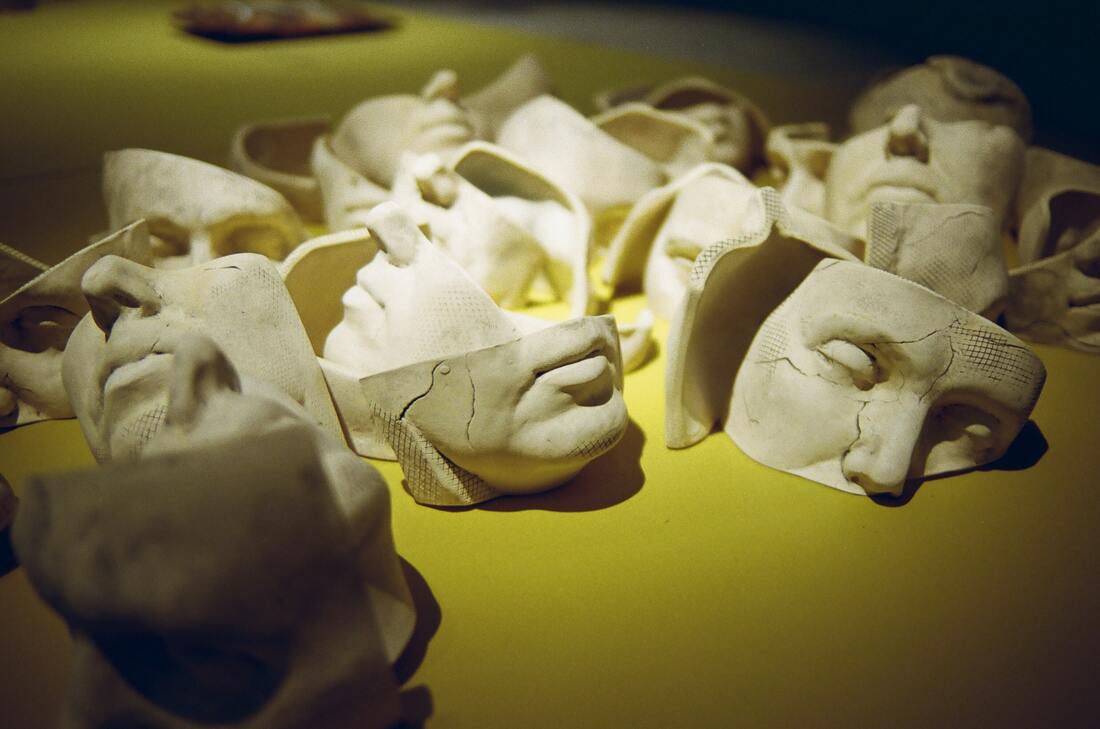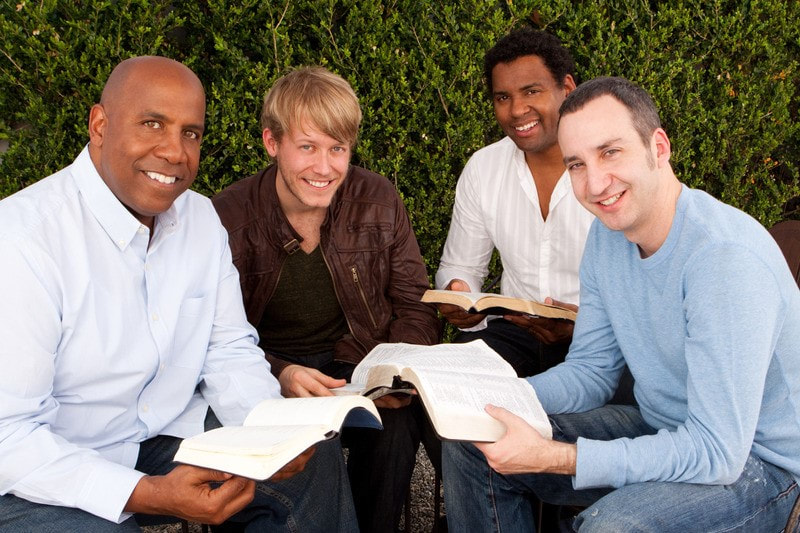|
The World Around You A few years ago the men in our church’s men’s ministry studied the words of the Apostle Paul to his young son in the faith, Titus. In chapter three of the letter that bears his name, Titus was instructed to encourage the people entrusted to his care to not be like the world around them – foolish, disobedient, deceived and enslaved by all kinds of passions and pleasures, living in malice and envy, being hated and hating (Titus 3:3). He then reminded them of something very important with these words: At one time they too were… just like that. Paul told Titus that because of God’s love, the redeeming work of Christ, and the renewing and washing work of the Holy Spirit, the Christians in Crete were no longer like the world around them. Have You Changed? That fact, very naturally, brought up a painful question in our group discussion: What if we still are like that? What if we’re still like the world around us? One possible answer to the question was even more painful: No change in your life may mean you aren’t in Christ... that you haven’t been redeemed, washed, and renewed. We’re all at different places in our relationship with Christ. And, of course, we all walk at different paces with him. Thus, we won’t all look alike. Yet, if we can’t look back at our lives a year ago, two years ago, or five years ago and see some sort of growth, some level of maturation in faith, love, godliness, and the rest of the fruit of the Spirit, then we may well need to ask the question: Am I truly in Christ? Of course, only God knows the heart, and this isn’t about others judging you. But it is about each person making an honest assessment of himself or herself. There’s no getting around the fact that true faith in Christ will result in a changed life. We can’t possibly remain the same. Facing the Music About eight months after I graduated from college, I went back to visit a few friends who were still there. I also returned to share with them the news that God had called me into ordained ministry, and I would be heading off to seminary soon. I was very excited. I was also a bit nervous. Why was I nervous? Well, I had not always lived a godly life while in college. I knew it and I knew my friends and fraternity brothers knew it. What happened? Well, my closest friends thought my news was great and wished me well. Others laughed me out of the room. I absolutely deserved it. Glory to God I give glory to God, and God alone, that 34 years later I can point to real change in my life. And, as the old saying goes, while I’m not where I pray I will one day be in my faith, by God’s grace I’m not where I once was. I don’t know if I was the chief of sinners way back then, but I certainly was competing for the title. That fact makes the following words from Paul all the more precious to me. Christ Jesus came into the world to save sinners – of whom I am the worst. But for that very reason I was shown mercy so that in me, the worst of sinners, Christ Jesus might display his immense patience as an example for those who would believe in him and receive eternal life. (1 Timothy 1:15b-16) If God could work in Paul’s life, as well as my own, then he can work in any person’s life. I praise God for the truth and power of the Gospel of Jesus Christ to change lives. Where Are You? So where are you now compared to where you once were? Do too many of the descriptions in the New Testament of the unbelieving world still describe you? Are you moving on to maturity with Christ, training yourself for godliness day by day? The progressive nature of growing in Christlikeness means it will never end on this side of heaven. But faithfulness to Christ does require we get started. We start with rebirth. We continue by growing in the grace and knowledge of the Lord Jesus Christ through the power of God’s grace and Spirit. Are you moving forward? Have you started yet? Walking Points
Prayer
0 Comments
Ephesians 5:15-17 - Be very careful, then, how you live–not as unwise but as wise, [16] making the most of every opportunity, because the days are evil. [17] Therefore do not be foolish, but understand what the Lord’s will is. Here Today, Gone Tomorrow Scripture says we are like vapors which are here today and then, POOF, gone in an instant. Some of us may live to the national average or even past it. Others will not live that long. Whatever the case may be, Scripture reminds us, “man knows not his time.” Therefore, since no one knows when they will be called home, doesn’t it make sense to make the most of every day as though it was our last? Have you ever been asked what you would do if you only had one week or month left to live? Often, when we’re asked such a question, we offer a sweet, sentimental, or even profound answer that stresses urgency. Yet, few “live out” their answers because they suppress the truth of reality and mistakenly believe they have an infinite supply of time and opportunities before them. In our Scripture, the Apostle Paul says this is unwise. Making the Most of Time Paul instructs us to be careful in how we live. He says we need to be wise, not unwise, and make the most of every opportunity. Many of the great saints of Christian history referred to this as, “redeeming the time.” Your life is a gift from God. You are called to be a steward of it. In a real sense your life is not your own. In Romans 12, the Apostle Paul said followers of Christ must offer themselves as living sacrifices to God. He lived during Israel’s sacrificial system in which the animal “gave up its life” on the altar. If we are called to be living sacrifices, we must daily put ourselves back on the altar before God in dedication to him, because living sacrifices tend to crawl off the altar by the end of each day. There is cost involved here to be sure. To give ourselves to the Lord in this way will require sacrifice, commitment, and self-discipline. To redeem the time we have been given, to make the most of every opportunity, we must change the way see and think about our daily lives. A change of perspective is required. An Eternal Perspective Needed God can be glorified in our most mundane tasks. Whether we are driving to work, mowing the yard, or wrestling with our children, we can do so to God’s glory (1 Corinthians 10:31). What matters is the motivation of our heart. Martin Luther is attributed as saying a cobbler who makes excellent shoes on Monday glorifies God as much as the pastor who preaches the Gospel on Sunday. Both require an eternal perspective and motivation that transcends themselves. Isn’t it a relief to know you can glorify God without necessarily moving to the other side of the world as a missionary or becoming an ordained pastor? You don’t have to be doing something “religious” to redeem your time. The Apostle Paul said whether you eat, or drink, or whatever you do, do it for God’s glory. What’s more ordinary than eating and drinking? What you are doing is not as important as why and how you are doing it. Therefore, start praying for ways in which you can redeem your time in 2021.But don't forget to make the most of every opportunity you have today. Walking Points · What are some ways you unthinkingly waste your days and miss the opportunities God has for you? What are some reasons you do so? · How can you change the focus and motivation of your daily life from the temporal minutiae to an eternal perspective that seeks God’s glory? · What are three ordinary things you do daily that can be transformed by wisely making the most of them? · Share your ideas with someone you can trust to hold you accountable and will pray for you. Prayer The Dilemma No person fails on purpose. Yet, spiritual, and moral failures abound. A few years ago, I taught a lesson to my church’s men’s group which focused on temptations men face. The workbook we were using quoted C.S. Lewis on this subject and was a turning point for many in the group. Lewis wrote, “It does not matter how small the sins are, provided that their cumulative effect is to edge the person away from the light and out into the nothing… Indeed, the safest road to hell is the gradual one – the gentle slope, soft underfoot, without sudden turnings, without milestones, without signposts.” The truth communicated by Lewis rang true. It reminded me of something a former mentor of mine once said. He emphasized repeatedly that compromise comes through the smallness of our daily surrenders. It’s giving up that little bit of personal conviction each day. It’s the little piece of candy no one will ever know you ate. It’s watching that program or visiting that website when you are all alone. You get the picture. Usually the first surrender to “small, insignificant sins” makes it easier to fall prey to them again and again. The damage comes from the “cumulative effect” Lewis was pointing to. Few people wake up in the morning planning to sin spectacularly later in the day. Yet those daily surrenders build up over time. Give a little ground here and there and before you know it, you’re in trouble. In fact, you become practically unrecognizable, even to yourself. You didn’t plan for this to happen, but those daily surrenders were enough to do the trick. The Solution Therefore, we must be vigilant. We need to work from the foundation of knowing who we are in Christ. We need to count ourselves dead to sin and alive to God in Christ Jesus (Romans 6:11). Those “daily surrenders” needn’t reign over us. The same Spirit who raised the Lord Jesus from the dead dwells in us as well. Yet, we also need to exercise the self-awareness that recognizes those areas in our lives wherein we are weak. Every person ought to ask himself or herself: Am I being less watchful in some areas of my life than others? Even the small, seemingly insignificant areas? Am I overly confident I would never again fall prey to that particular temptation? A member of my church used to remind me often, “to be forewarned is to be forearmed.” If you want to avoid those small daily surrenders, then pray for God to deliver you from temptation. But don’t forget to do your part. Name those temptations in advance. Talk with a godly person you trust and ask them to hold you accountable. Renew your mind daily in God’s Word. The Apostle Paul shared God’s wisdom on this point when he wrote in Philippians 4:8-9, Finally, brothers, whatever is true, whatever is noble, whatever is right, whatever is pure, whatever is lovely, whatever is admirable—if anything is excellent or praiseworthy—think about such things. 9 Whatever you have learned or received or heard from me, or seen in me—put it into practice. And the God of peace will be with you. What are you thinking on? Walking Points
Merciful and patient Lord, I don’t want to sin. I don’t want to “fail on purpose.” Yet I confess to you that I have not always put in place or practiced those wise spiritual disciplines that would draw me ever closer to you and protect me from the snares of the devil and my own fleshly weaknesses. Please forgive me and renew me. As David cried out, put a right spirit within me. Give me such a desire for you that turning away from you would be the last thing on my mind. Give me greater Spirit-enabled self-discipline and self-control to practice those means of grace you have given to your children to help us conform more and more to the likeness of your Son, our Lord and Savior. For it’s in his name and for his sake I pray. Amen. Ephesians 6:4 - Fathers, do not provoke your children to anger, but bring them up in the discipline and instruction of the Lord. Every Father's Calling I love my kids. I love being with them, reading, wrestling, talking to and listening to them. I like beating them at Boggle. I love being beat by them at Boggle. One thing I really love is discipling my kids – teaching them every day, all day (Deut. 6:4ff) the things of God. This is every father's greatest calling, joy, and responsibility. Faithfulness in this can bring about a legacy that could last many generations. If you are a father, you should know, whether or not you are evangelizing and discipling anyone else, (and, of course, you should be), you surely ought to be evangelizing and discipling your children. To be sure, God commands it, but it is also one of life’s great joys. By the very nature of things, this will be a 24/7/365 task. There are at least two reasons why this is the case. Humble Consistency First, you can’t pass along a platitude occasionally and expect it to take root. The lessons of our faith must be repeated over and over again in a variety of ways – when you sit down for breakfast or dinner, tuck them in at night, drive them around town, have family worship, do chores together, and so on. No one gets it right all the time, but even in our parental blunders, our mistakes and shortcomings are opportunities to teach lessons such as forgiveness, repentance, humility, and perseverance. But, we are indeed called to “practice what we preach,” for our own sakes as well as to model godly behavior before the wee “watching eyes” in our homes. Going Against the Cultural Grain The second reason we must devote so much prayerful time and effort to discipling our children is because we live in a culture that does not cultivate Christian character. Our world’s default key is stuck on sin, rebellion, and evil. If I want to change the font on my computer, I have to consciously make the effort to find and select the one I want. So too, if we want to nurture our children in the things of God, we have to make an intentional and considerable effort, for such effort will go against the grain of the world, the flesh, and the devil. This is simply the way it is. Let’s Be Faithful Stewards Let’s join together in raising kids who know and love the Lord. Let’s produce and reproduce faithful disciples in our homes who will one day serve Christ and take his gospel of the Kingdom and extend it into every sphere of life. Such children will not arise accidentally. But, by God’s grace, they will become such as they are educated, equipped, and encouraged by loving parents who honor God by being faithful stewards of the most precious treasure entrusted to their care. Walking Points
Prayer James 1:8 – he is a double-minded man, unstable in all he does. How’s Your Integrity?
Let me ask you a few questions that relate to this issue of being double-minded.
Those are some pretty tough questions. And while none of us probably moves from sphere to sphere – from group to group – with perfect consistency, we still need to ask the question: How wide are the gaps? Whole, Entire, Undiminished Part, maybe even most, of that consistency will come from how “integrated” our lives are regarding our relationship with God. The words “integrated” and “integrity” come from the same root word. One of the dictionary’s definitions for integrity is, “the state of being whole, entire, or undiminished.” The double-minded man, however, is not known for their integrity, but their duplicity. Duplicity means, “deceitfulness in speech or conduct; speaking or acting in two different ways concerning the same matter with intent to deceive.” Duplicitous men do not have integrity. They are not whole, entire, or undiminished. They have no unifying factor that keeps them whole. The Unifying Factor But the Christian man does have such a unifying factor. The question is: Does he make use of it? Is he related or connected to it? This unifying factor isn’t an “it” at all. It’s God. We’re called to be God-centered men who are living God-centered lives. Such a man will not speak, think, and act differently and deceptively with different people and in different settings. Why? Because the man of God will be vitally connected to the same God in every sphere of his life. God doesn’t change. Because the godly man's life will have God as his unifying center, he will not change from place to place, from circumstance to circumstance. God-centeredness makes and keeps us whole instead of fragmented and compartmentalized. Loving and Glorifying God Think for a minute about what the Great Commandment says. Jesus says in Mark 12:30, we are commanded to, Love the Lord your God with all your heart and with all your soul and with all your mind and with all your strength.’ That’s all of our heart, soul, mind and strength. In other words, with all that we are. Our whole being. Every aspect of our lives. Paul writes in 1 Corinthians 10:31, So whether you eat or drink or whatever you do, do it all for the glory of God. You’re not glorifying God in the big or small details of your life if you’re double-minded. By the way, a good way to check yourself out on this is by asking:
God’s Expectation A couple of Old Testament texts that really hit home are,
God expects us to walk with integrity before him and others. How Are You Doing? How are you doing in the various spheres of your life? I don’t know about you but I want to be the same man in every sphere of my life: In private, at home with my family, work, church, or with my friends. I want to be the same person regardless of who I’m with or where I am. How about you? Let’s pray God will form and shape us into the God-centered men of integrity he’s called us to be. Walking Points Take a look at the list below and ask yourself how you're doing in those areas. Are you living a consistently God-centered life in each? If not, why not? What can you do today to become more consistent in the following areas?
He must also have a good reputation with outsiders, so that he will not fall into disgrace and into the devil’s trap. (1 Timothy 3:7) You have probably heard the definition of character as, “who you are when no one is looking.” You could also say that character is who you are when those who know you best are looking.
In the second chapter of The Measure of a Man, Gene Getz looks at what it takes to build a good reputation. This is rather a tricky area because some folks may enjoy a good reputation superficially because they’re able to reasonably fake it before people they don’t know well and with whom they associate only on an occasional basis. But living a life that builds a good reputation is hard to fake on a regular basis with those who know you best… such as the members of your family. Let me hasten to add that the expectation here is not perfection. As one person I recently read put it, the idea here is direction, not perfection. The question is: Are you moving in a Christlike direction in your life? Is that your intention? In our Scripture, Paul recommends to Timothy that the kind of person he should be looking for to exercise leadership in the church ought to have a good reputation. Christians are charged with hypocrisy enough as it is. And even if the charge isn’t always accurate, the mere perception can derail a life or a ministry. Worse still, we don’t want to misrepresent our Lord before a watching world. Getz suggests that Timothy was such a person… a man with a good reputation. He highlights these three indicators… 1. People were saying positive things about Timothy. 2. More than one person was saying these positive things about Timothy. 3. People in more than one location were saying these positive things about Timothy. It seems wherever Timothy was and whomever he was with, Timothy was a godly man living above reproach. Thus, he enjoyed a good reputation. Ask Someone Getz suggests that if you really want to know your reputation (as it relates to your genuine character) ask someone who knows you best. This might sting a little, but it’s a good way to get an honest and accurate perception of who you are… and it will go a long way in helping you become the godly person you want to become. Ask Yourself Just as important, we occasionally need to conduct a personal assessment of who we are and what we’re about. Getz suggests asking yourself the following questions (these are great questions, by the way) 1. Do more and more people select me as a person to share their lives with? 2. Do people trust me with confidential information? 3. Do my relationships with people grow deeper and more significant the longer they know me and the closer they get to me? Or do my friendships grow strained and shallow as people learn what I am really like? 4. Does my circle of friends grow continually wider and larger? Do an increasing number of people trust me? 5. Do people recommend me for significant or difficult tasks without fear of my letting them down? The point in all of this is not to build a reputation by duplicity and manipulation. To be sure, there are plenty of people doing that. Instead, our goal should be that as we grow in godliness, the authenticity of our increasingly Christlike character will be made evident to all. And that’s how we can represent our Lord well in this world. Ultimately, those of us who are in Christ are seeking to advance the glory of our Lord’s reputation, and not our own. But we can’t avoid the connection that our reputation will be linked to his, so let us live lives above reproach and for his praise and glory. John 1:38a - Jesus turned and saw them following and said to them, “What are you seeking?” What Are You Seeking? · Where are you going? · How are you going to get there? · How will you know when you’re there? A few of years ago I received a newsletter from Len Sykes. Len is a godly man who mentors, teaches, disciples, coaches, and leads men in the Atlanta area. In his newsletter, Len shared a little about his ministry. I’m always encouraged when he shares what he’s doing, as well as what God is doing through him, because there’s so much I can learn about my own life and ministry. Len wrote a little about his passion, mission, and vision for his ministry. He said those are the three main areas he encourages his men to focus on. The three questions I listed at the top of this devotional are my paraphrase of what Len is talking about. These are important questions to ask because, as the old saying goes, “If you don’t know where you’re going, then any road will get you there.” There are a lot of men who have no idea where they’re going and they’re making great time getting there. These issues of passion, mission, and vision are very important. I think most men want to live for something bigger than themselves. Part of their frustration is they either don’t know what that something is, or they have an idea, but aren't quite sure how to pursue it. Passion This is the “why” question. What drives you? Why do you get out of bed in the morning? Len says passion is “the emotional/inspirational element of our desire.” It’s that which energizes us. What’s your passion in the various spheres of your life? For yourself as a man of God? For your family? For your work setting? For your church? For your personal ministry? For your community? What’s that something bigger than you that you want to live your life pursuing in each of those areas? Mission Len next points out that mission “relates to how we carry out our desires to serve the Lord and his people.” In other words, how are you going to fulfill your passion? How are you going to get there? What’s your plan? Who are those brothers in your life who are going to help you get there? Vision This last component “relates to what the end result” of your passion and mission will look like. In other words, how will you know you’ve fulfilled your mission (or that you’re making progress in the right direction)? Lots of aimless activity is not the same thing as moving toward your goal. Having a vision of what the goal will look like will help you focus and persevere as you move toward your dream of that “something bigger than yourself.” My Prayer for You My prayer for each of you is not only for you to have a passion, mission, and vision, but also for you to spend your life pursuing them as they relate to each sphere of your life – your personal spiritual growth, as a husband, father, employee/employer, church member, neighbor, etc. To be sure, this is a huge undertaking, but can you imagine anything worthier of your time and energy? My family’s life-verse is 1 Corinthians 10:31, which says, “So whether you eat or drink or whatever you do, do it all for the glory of God.” From the extremely important to the utterly mundane, all of life is to be lived for God’s glory. My children probably grew tired of hearing this repeated over and over as they were growing up, but hopefully they could cite it to you. More importantly, I pray they are seeking to live it out. This is a key idea behind the phrase, “living life on purpose” or “living intentionally.” Having a passion, mission, and vision, when pursued according to God’s Word, will help you glorify God in all the spheres of your life. If I can help you discover, develop, and pursue your “something bigger than yourself,” please do not hesitate to let me know. It would be a blessing to travel alongside you as you seek to follow God’s call in your life. Walking Points |
Click image above to subscribe to my newsletter.
Dale TedderThanks for stopping by. Learn more about me, my ministry, and this website by clicking here. Please visit my bookstore
Click, Listen, and Subscribe to My Podcast
Updated: 2-5-24 Connect and/or Follow for more content...
The Book of Acts
Updated 2-28-24 Sermons
Updated 3-4-24 Categories
All
Click the image above to order this book and study guide about the most important person you will ever meet.
Archives
January 2024
Click image above to learn more about and order this follow-up to "Lord of All."
Listen, my son, and be wise, and set your heart on the right path: (Proverbs 23:19)
“Enter by the narrow gate. For the gate is wide and the way is easy that leads to destruction, and those who enter by it are many. For the gate is narrow and the way is hard that leads to life, and those who find it are few.
(Matthew 7:13-14) |












 RSS Feed
RSS Feed





